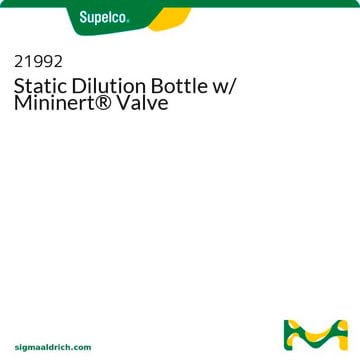68986
Dimethyl disulfide
analytical standard
Synonym(s):
DMDS, Methyl disulfide
About This Item
Recommended Products
grade
analytical standard
Quality Level
vapor density
3.24 (vs air)
vapor pressure
22 mmHg ( 20 °C)
Assay
≥98.5% (GC)
autoignition temp.
>572 °F
shelf life
limited shelf life, expiry date on the label
expl. lim.
16 %
technique(s)
HPLC: suitable
gas chromatography (GC): suitable
impurities
≤0.5% water
refractive index
n20/D 1.525 (lit.)
n20/D 1.525-1.529
bp
109 °C (lit.)
mp
−85 °C (lit.)
density
1.046 g/mL at 25 °C (lit.)
application(s)
cleaning products
cosmetics
flavors and fragrances
food and beverages
personal care
format
neat
SMILES string
CSSC
InChI
1S/C2H6S2/c1-3-4-2/h1-2H3
InChI key
WQOXQRCZOLPYPM-UHFFFAOYSA-N
Looking for similar products? Visit Product Comparison Guide
Related Categories
General description
Application
Signal Word
Danger
Hazard Statements
Precautionary Statements
Hazard Classifications
Acute Tox. 3 Inhalation - Acute Tox. 3 Oral - Aquatic Acute 1 - Aquatic Chronic 1 - Eye Irrit. 2 - Flam. Liq. 2 - Skin Sens. 1 - STOT SE 1 Inhalation - STOT SE 3
Target Organs
Central nervous system, Upper respiratory tract
Storage Class Code
3 - Flammable liquids
WGK
WGK 3
Flash Point(F)
59.0 °F - closed cup
Flash Point(C)
15 °C - closed cup
Choose from one of the most recent versions:
Already Own This Product?
Find documentation for the products that you have recently purchased in the Document Library.
Customers Also Viewed
Our team of scientists has experience in all areas of research including Life Science, Material Science, Chemical Synthesis, Chromatography, Analytical and many others.
Contact Technical Service














